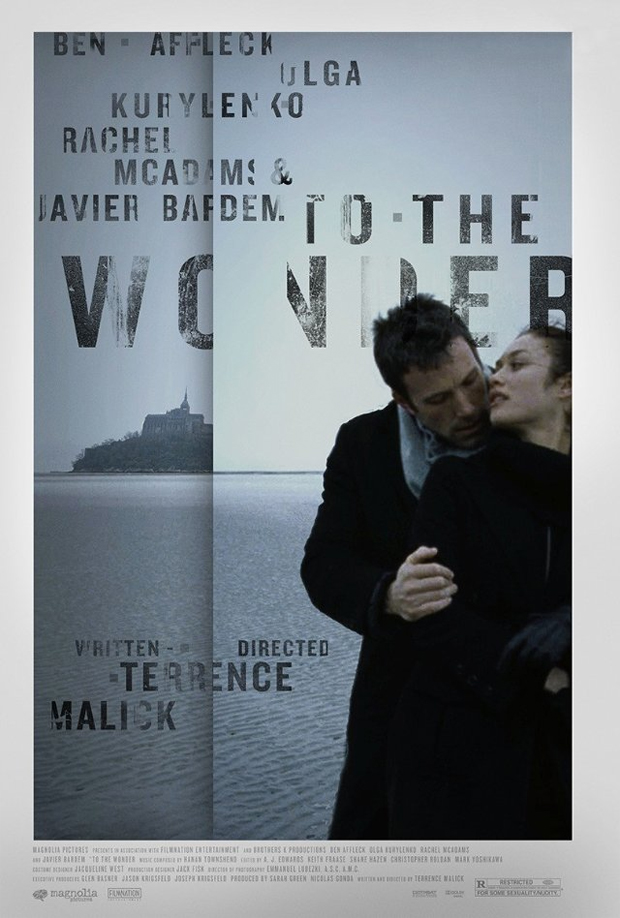
I could review To the Wonder by telling you that Olga Kurylenko plays Marina, a startling beautiful Parisian with a young daughter, Tatiana (Tatiana Chiline), by a philanderer who broke her heart. But she’s moved on, partly thanks to her new love Neil (Ben Affleck), an American who sends her into transports of ecstasy and intimacy, and who wants the pair to come to live with him somewhere in Middle America, where he works as an environmental investigator. The three take the plunge and begin to deal with…
Except I’m not sure this tells you much of anything about the experience of Terrence Malick’s To the Wonder, which is all about experience and wondering just what it is we feel and why. Aside from Tatiana’s, I’m not sure that we actually hear any character’s name (I got “Marina” and “Neil” from IMDb). But details like these—or even regarding exactly what happens plotwise—are unimportant, much as we don’t need to know what J. Alfred Prufrock’s parents were like to understand the T.S. Eliot poem bearing his name.
Everyone says Malick’s films are poetic, and that’s not just for lack of a better way to describe them. Poetry—at least the sort we think of as more “poetical” than narrative—is the artform of evocation, of implanting rather than explaining, an appeal to the visceral rather than the cerebral. There’s no sharp demarcation between one and the other, of course—nor are they mutually exclusive. There is no opposition. But poetry is a tactic, and it’s a major component in Malick’s strategy of storytelling.
Yes, there is a story in To the Wonder—multiple, really, some of which consumes our focus (Marina, Neil), some which comes into view less clearly or for shorter durations (Tatiana’s, a childhood acquaintance of Neil’s, a priest played by Javier Bardem), some of which we glimpse only for a moment (small-town victims of environmental pollution, a mentally unbalanced prisoner in chains, a meth-wasted body and soul)—but Malick’s cinematic language is fragmentary and naturalistic, external framings of the human experience in all transitoriness, a succession of vicissitudes wherein we sometimes find ourselves wondering about what, if anything, connects it all together, giving us substance and strength, which we feel as both presence and absence. “Emotions come and go like clouds,” we hear in one of the short, poetic internal monologs that are the film’s verbal marrow. “What is this love that loves you?” wonders Marina, reflecting on a spiritual resonance she sometimes feels symbolized by the natural worlds. “Everywhere you’re present,” the priest says in apostrophe to the God who often feels so absent to him, “but still I can’t see you.”
To the Wonder is lush to look at. Whether the camera is trained on pure sky and water or despoiled land, raw nature or societal development, vibrant Paris or stale Middle America, the idiosyncratic human form or regimented lines of commercial products and linoleum, Malick and cinematographer Emmanuel Lubezski find aesthetic glory, helping locate us as emotional/psychical/spiritual beings—for better and for worse—regardless of where are corporeal forms find themselves. A steady diet of well-chosen or -composed (by Hanan Townshend) music overlaying the whole business helps us locate ourselves there.
If ever there were a filmmaker who is not for everybody, its Terrence Malick. “Slow” is probably the most common reaction to every film he’s ever made, with “incomprehensible” running a close second. If you found The Tree of Life to be confusing or a bore, you really need to stay away from To the Wonder, because you’re not going to understand this one any better and you’ll find it even less exciting.
But if you’ve always liked Malick—or if, like me, you were never a fan but then found The Tree of Life beautiful and brilliant—To the Wonder is a treat (even if not as profoundly as its predecessor), a touching trek into noumenal, a glimpse into the struggles of a few spirits in the material world, spirits who seek but never find in any permanent sense, but keep on seeking, because what choice do we have, and because every now and then we feel that we connect with something, whether or not it’s really there.
To the Wonder is playing at the Art Theatre of Long Beach (2025 E. 4th Street, LB 90804) for one week only. For info on show times call 562.438.5435 or visit arttheatrelongbeach.com.
Postscript: This is the last film that the late, great Roger Ebert reviewed. Read his take on To the Wonder here.

